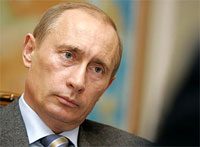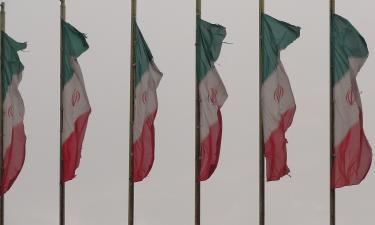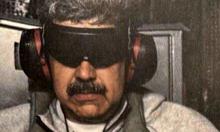Vladimir Putin: 'We don't allow others to interfere in our politics'
The press service of the Kremlin published a very lengthy interview which Vladimir Putin gave to Time magazine. The magazine named Russia’s president “Person of the Year” for 2007 for bringing political and economic stability to Russia after an extremely hard period of the 1990s.

One may say that Putin has never been so open in his conversation with Western reporters. A virtually summarized the results of his two-term presidency, expressed his opinion on a large number of issues and shared his personal secrets.
The Time interviewer made a mistake when he asked Putin about his current relations with Boris Yeltisn and Mikhail Gorbachev. Putin replied calmly: “Mr. Yeltisn is dead, as you know.” “I am sorry,” the reporter said.
The journalist of the magazine started the interview with another mistake about Putin's age. “You were born in 1946, I was born in 1948. We belong to one and the same generation. We grew up in the countries that lived under the circumstances of the constant presence of the enemy. Despite the cold war, Russia and the United States have found themselves aligned in many of history's big conflicts: World War I, World War II and now, thanks in large part to your response to 9/11, there seems to be some alignment in the war against Islamic fundamentalist terrorism. With that history in mind, how do you envision the relationship between Russia and the U.S. going forward?
A: Indeed, Russia and the U.S. were allies during the two tragic conflicts of the Second and the First World Wars, which allows us to think there's something objectively bringing us together in difficult timess, and I think—I believe—it has to do with geopolitical interests and also has a moral component. Of course, the cold war marked a tragedy in relations between our two countries, and I wouldn't want to see the vestiges of those relations prevailing in the future. And I'll be frank with you. In the past decade or so, maybe in the last 50 years, the idea that the United States is a unique nation seems to have taken root in the U.S. public psyche. It's perhaps not an absolutely groundless notion. It's a historical phenomenon that in 250 years, a nation could move from a colony into the most prosperous nation of the world and the leader of the world. It is indeed an achievement, a tribute to the talent of the American nation, the American people and an optimal political and economic system. However, as a rule, leaders do not have rights; they mostly have commitments and obligations. When they come to think that they have rights, they tend to lose their position and authority. When we used to have two world groupings, the so-called Western bloc headed by the United States and the so-called Eastern bloc headed by the Soviet Union, both sides instilled strict discipline among members of their communities. That worked at the time. Today, when the vast majority of actors in the international scene do not feel such an external threat, this manner of conduct of dictating to anyone—please don't take offense at this—indicates a lack of understanding and utter rejection. Today other forms and instruments of international intercourse are called for, as well as other means of countering the prevailing threats. Today to be successful, one must be able to reach agreements, to compromise. The ability to compromise is not a diplomatic politeness toward a partner but rather taking into account and respecting your partner's legitimate interests.
Q: What do you think should be done in Iraq?
A: Well, our position on Iraq is well-known. From the very beginning, I considered that it was a mistake, and I was public about it. The developments in recent years have proved that we were right. People consider the occupation not as a fight against Saddam's regime. They take it as a personal matter, and terrorism is capitalizing on this, and terrorists who were not present in Iraq are now present there. What we differ over is that the U.S. believes it is impossible to impose time frames for the withdrawal. In my view, it would prompt the Iraqi authorities to be more proactive. If they know they will always have American armed forces behind their backs, they may feel comfortable under such an umbrella, but if and when they know that the deadline is there, they would be forced to think about what they need to do from then on.
Q: The American media have portrayed your nomination of Dmitry Medvedev as President, and the likelihood that you will become Prime Minister, as an effort by you to succeed yourself, becoming a so-called national leader. A lot of Americans feel President A is trying to get around that by assuring a leadership position for himself in the future by making the prime ministership strong and the presidency weak.
A: One could have thought that, if I indeed were to either change the Russian constitution to suit my cherished and beloved self, dropping the limit on terms, or if I were to change the constitutional legal correlation between the offices of the government and the President. I believe that neither is admissible nor acceptable for Russia. Russia is a nation, like the United States, with a balanced but strong presidential power, and I am adamantly against stifling and restricting the authority of the President. I'm prepared to accept Dmitry Medvedev's offer to serve as the Premier, in which case I would be guided by the constitution and law within the authority as prescribed by law. Now speaking about that idea of a national leader, I believe that is not an administrative or even a political category. It cannot be defined in terms of the number of telephone units on your desk. It's a moral category based on the trust of the people.
Q: In America even a sitting President would envy your popularity ratings. That's one reason that I think our readers and Americans in general wonder why the recent Russian election could not have been more open and they wonder why, for example Garry Kasparov was put in jail, however briefly.
A: Well, what do you think: Why did Mr. Kasparov, when arrested, speak out in English rather than Russian? Just think about it. The whole thrust of this thing was directed toward other countries rather than the Russian people, and when a politician works the crowd of other nations rather than the Russian nation, it tells you something. If you aspire to be a leader of your own country, you must speak your own language, for God's sake. I wouldn't like to offend anyone but let's remember that the first election of the current U.S. President wasn't free of difficulties. It was decided through the court. We are not trying to force you to change your internal procedures. This is your sovereign right. Why would anyone think that they are entitled to interfere into our internal affairs? That is the main issue and problem in our relations. Well, why would you decide that your civilization is the best? All the participants in the parliamentary and presidential race have access to the mass media. Just look at the TV channels here: so-called opposition figures were always on some channels. There was very serious financial support given to them. They were given all possibilities to publicly express their views, their positions, in the street, in the squares and elsewhere—but only where it's allowed by the law and the local authorities, of course.
Q: It sounds like the reason Mr. Kasparov was challenged was because he speaks English. I want you to explain what the problem is there, and why that's a matter of law.
A: Well, you don't need to explain to me. You are asking to interview me, so I know why he did that. I don't need his explanation. If you want to ask me something ask me. It's not about him here.
Q: We asked why a prominent opposition figure was detained and your original answer was because he speaks English. I wanted to ask you, is that in fact what you meant? But secondly, it makes one wonder, are you worried about the seeds of a destabilizing opposition? You have very high popularity numbers, but are you concerned that an "orange revolution" could take place?
A: Well, look at the outcome: 0.9%. The right opposition didn't even get 1%. Why should we be worried or concerned? In the political sense, there is no worry at all. It's not about this. It's about something else. The issue is, the tools foreign states are using to interfere in the domestic political affairs of Russia. This is the story.
Q: Let's talk about the U.S. election. Who do you think would make a good American President?
A: Well, probably you didn't get my point. The basis of our approach is we believe that it's detrimental to interfere in foreign affairs. We don't allow others to interfere in our politics, but we are not prepared to meddle in other people's affairs. Well, you know, strange as it might seem, one of my colleagues in Europe, said once, "I thought that Moscow supported this candidate." I was very surprised. It's not our policy. We think it's not decent.
Q: Do you think the U.S. wants to see a strong Russia, or a weak Russia?
A: I believe the U.S. already understands and will understand more and more that only a strong Russia will respond to the genuine interests of the United States.
Q: On the topic of organized crime, one of the perceptions that Americans have about Russia is that corruption is endemic here. How do you handle and control that?
A: Badly. We badly control it and handle it badly. I must say that in the transitional economy, and especially under the conditions of restructuring the political system, it is difficult to address such problems. Unfortunately, we have not worked out a system of oversight by civil society of the activities of government authorities. But I'm fully convinced that down the road these problems will be tackled more efficiently than they are today.
Q: Do you believe in a Supreme God?
A: Do you? ... There are things I believe, which should not in my position, at least, be shared with the public at large for everybody's consumption because that would look like self-advertising or a political striptease.
Q: What do you do for fun?
A: I don't have much time for leisure. I occasionally go to the theater. I like classical music: Brahms, Rachmaninoff, Tchaikovsky, Mozart, Schubert, Liszt. Beautiful tunes. What else? Every day for two hours I work out in the gym, usually in the morning or other times depending on my work schedule. That's about it, I guess. And I work.
Q: Has your KGB training helped you as President?There's an old saying, once a spy, always a spy.
A: Well, those are lies. We're all human beings. Naturally some of that background can be of help. What was positive I think is that at my university and subsequently in the KGB where I was placed upon graduation from law school, they taught me to think independently. They taught me to gather information, objective information, first and foremost. To analyze this information and on the basis of objective information to adopt decisions independently.
Q: In which category would you put assassinated journalist Anna Politkovskaya?
A: Well, you know, each situation is unique. In the case of Politkovskaya, it was implied that she was a danger to the state. You know that's nonsense. If you're a Russian expert you know that Ms. Politkovskaya did not play any meaningful role in Russian political life. She was no threat, no danger whatsoever. Her murder was a provocation against the authorities, I believe. Nobody ever so much as mentioned her until she was killed. Her activities were known within just a restricted circle of people. You could count them all on one hand—but now the entire country and the whole world are talking about her. I see it as deliberate provocation: they chose a sacrifice and destroyed a woman. Still, we'll do whatever it takes to complete this investigation to the successful end.
Q: I'm curious what you think are the American misconceptions about Russia, about the Russian people, about you, about the Russian government. If you were speaking directly to the American people, what misconceptions would you try to clear up?
A: Well, you know, I don't believe these are misconceptions. I think this is a purposeful attempt by some to create an image of Russia based on which one could influence our internal and foreign policies. Russia has demonstrated that we don't want simply to be a partner, we want to be a friend of America. Sometimes one gets the impression that America does not need friends. Sometimes we get the impression that you need some kind of auxiliary subjects to take command of. We cannot build our relations on such grounds and this creates frictions now and then, and this is precisely the reason why they always seek to find some problems inside our country. This is the reason why everybody is made to believe like it's O.K. to pinch the Russians somewhat. They are a little bit savage still or they just climbed down from the trees, you know, and probably need to have their hair brushed and their beards trimmed. And have the dirt washed out of their beards and hair. That's the civilizing mission to be accomplished out there. But I believe this is a tool to affect others, which is a wrong way to go. The right way would be to find common ground and take account of each other's interests in the first place.
Q: When you were growing up, and even as a mid-career intelligence officer, did it ever occur to you that you could end up running this country and taking it through such a period of tumult and change?
A: It never occurred to me, no. It never struck me. Never.
Q: Does it still surprise you?
A: Yes, it still surprises me. I came to Moscow from St. Petersburg in 1996. I was chairman of the government three years later, of the government of Russia. And half a year after that I became the President. When I came to Moscow I didn't have any connections or friends to rely on in the right places. I came because the person I worked with in St. Petersburg, Mayor Anatoly Sobchak, lost an election, and they had difficulty finding me a job there. Nobody would hire me there, in fact. I'm surprised myself. Well, this happened because people close to the first President of Russia, Mr. Yeltsin, realized, should I say, that I would be totally sincere and would spare no effort to fulfill my duties and be honest with the President, and I would do whatever it takes to see to it that the interest of the country be secured. I would think this was what really mattered. This was the motivation of Yeltsin himself and the people around him.
Q: President Bush famously said that he looked into your eyes and got a sense of your soul. So my question for you is, Have you gotten a sense of President Bush's soul, and if so, what did you see there?
A: I do not wish myself to give a character description of this President because when he said that he looked into my eyes, he said what he felt. But I have a very good personal relationship with Mr. Bush, and I cherish it very much. I consider him a very reliable partner, a man of honor. When I have the pleasure of conversing with some American intellectuals, whom I won't name, they argue with me on this. I do not agree with those, both in my country and in the United States, who deny that Mr. Bush is a man of honor and of principle. Yes, Iraq was a mistake, but he is a person who has had a very rich personal life and experience governing a state. He is a fair and honest man. I have no doubts about this.
Q: Earlier you used the phrase, Thou shalt not steal. Have you read the Bible?
A: Yes, I have. And the Bible is on my plane. I fly frequently, you know. And on the plane I use, there is a Bible. I also have an icon there with some sewing on it. I fly long distances. We're a vast country. So I have time there to read the Bible.
Q: One last question, earlier you talked about one's authority being linked to how many telephones they have on their desk. It's a very old-fashioned image. So my question is how technologically connected are you? Do you send and receive e-mail? Do you have a BlackBerry? Do you blog?
A: Well, it's a big shame, I don't use these technologies. I don't even use a telephone. My operators, my staff do it for me. But they do it wonderfully, and I'm very envious. Well, it's not important how many telephones you have. How can you measure authority? It's the trust of the people. No other measure matters; others are just illusions. I am very thankful to the people, that they sense that indeed over these eight years I have been working honestly. I'm grateful for this trust.
You can read the full interivew with Time's Person of the Year 2007, Vladimir Putin here
Subscribe to Pravda.Ru Telegram channel, Facebook, RSS!





